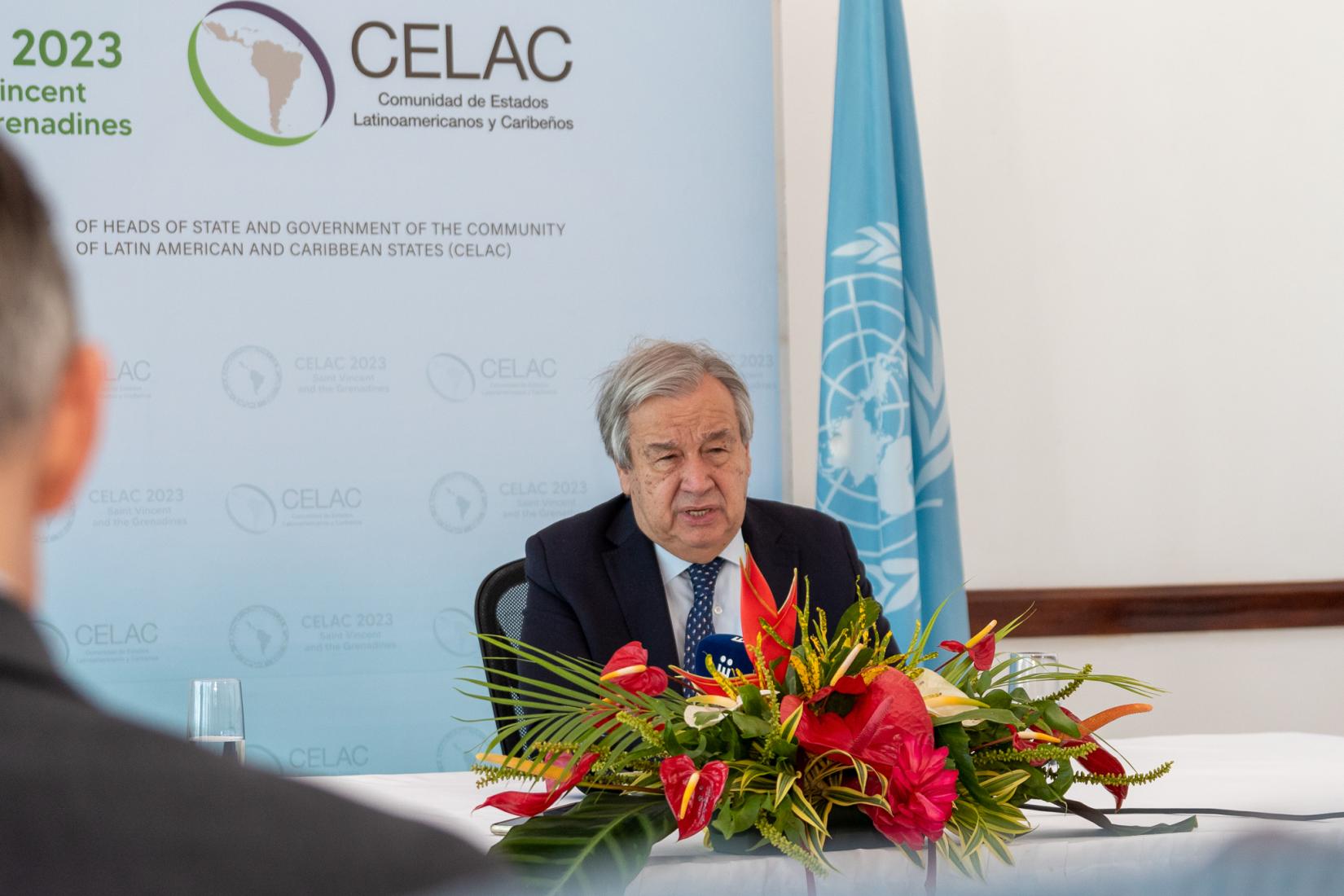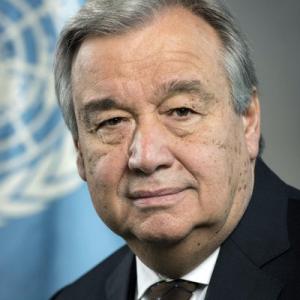UN Secretary-General's press encounter in Saint Vincent and the Grenadines
UN Secretary-General expresses solidarity with Latin America and the Caribbean, urges reform of international financial system and climate justice.

Ladies and gentlemen of the media,
Let me first of all, express my deep gratitude to Prime Minister Gonsalves for having invited me to participate in this CELAC Summit and to intervene in the opening session. But this visit goes beyond the participation in a Summit. It’s a visit in which I would like to pay a few tributes and to express a deep solidarity.
The first tribute is to Latin America and the Caribbean as a continent of peace, in a world where we see a proliferation of wars and conflicts of all kinds. Today, I was shocked to know that, in another episode of the war in Gaza, 100 people that were queuing to receive humanitarian aid were killed.
I think that a situation like this would require an effective independent investigation to detect how it was possible and those responsible for it. And at the same time, there is the reported number of more than 30,000 civilians that have died in Gaza since 7 October, making it an unprecedented number of civilians killed in a conflict since I have been Secretary-General.
Now, in this context, to see Latin America and the Caribbean as a continent of peace, and to see that when a problem arises, and recently we had one with two neighbours, Guyana and Venezuela, there is a mediator that emerges and is able to bring the parties together and to avoid a conflict. And so, I want to pay tribute to Prime Minister Gonsalves for his permanent role, always very attentive to any possibility of conflict, and his engaged, active and effective mediation, as I also have seen in relation to his very strong commitment to the solution of the problems in Haiti.
And paying tribute to him, I want to pay tribute to the courage, the resilience and the solidarity of the people of Saint Vincent and the Grenadines. When the volcano exploded, and when this island and its population faced the dramatic tragedy, I could witness the way this country was able to mobilize everything. The solidarity of the people, the courage of the people, the determination of the people - that is something that is an example for all of us, everywhere. And once again, I want to express my enormous appreciation for what was done in the immediate response and in the reconstruction that followed.
But I also want to express a deep solidarity to the countries of Latin America and the Caribbean. Many of the economies of the continent are in deep trouble. When COVID-19 devastated the world, the truth is that developed countries, like mine, in the European Union, were able to print money in large quantities, to support their people and to support their economies.
Countries in Latin America and the Caribbean, the overwhelming majority could not print money because, if they would have to print money, their currencies would suffer enormously. And so, they had to borrow in order to solve the problems of their people and their economies after COVID-19. And we see now so many economies in this continent drowning in debt, and we see that an unfair, ineffective, and outdated international financial architecture has proven unable to support these countries in this moment of distress. To make things worse, with the war in Ukraine and with other impacts, prices went up, interest rates went up. The impact on their economies has been terrible. But many of the economies of the region are middle-income countries, and middle-income countries have no access to concessional funding, and they have no access to debt relief that is effective.
It's time for a reform or our international financial institutions. It's time for a new Bretton Woods movement in which developing countries can see an international financial system able to address the enormous challenges that they face.
And the last word of solidarity is for Small Island Developing States. They are on the front lines of the fight against climate change. They are the ones that suffer more with the impacts of climate change, and they have not contributed to climate change. But even not having contributed to climate change, they are also on the front lines of adopting the measures of mitigation to reduce emissions that are, of course, very limited from the beginning, but to show their solidarity with the world. And it is absolutely essential that there is not only a much bigger ambition in relation to the reduction of emissions. And that is essentially a responsibility of the G20 countries that represent 80 per cent of the emissions.
But we need much more climate justice. Which means much more finance available at reasonable cost for adaptation and mitigation for developing countries, and in particular for Small Island Developing States.
And so, this is the moment to recognize that countries of Latin America and the Caribbean that have been victims of an unfair international financial system, and that many of them in particular are victims of a runaway climate change, have the right to claim for the reforms that are necessary in order to create the conditions for their governments to be able to act providing their peoples with the response to the needs that need to be addressed.
Because it is absolutely unacceptable that lack of investment in education, or in housing, or infrastructure, is the price paid for an unfair international financial system in the moment of a global multiplication of wars and conflicts that represents the threat to international peace and security.
Question: We live in a hemisphere that has a lot of different issues and also we have various types of organizations at various levels? How do you see CELAC playing a particular role including those issues in the hemisphere?
Secretary-General: I've always been supportive of integration. Economic integration, political integration, as the key instrument for regions to be able to allow their countries to cooperate more strongly and cooperating more strongly to be able to better defend the interests of their people. So I believe that CELAC is an extremely important tool to push for a progressive economic and political integration in the Latin American and Caribbean world.
Question: July 6, 2023 you spoke on two issues. And you mentioned that to address the problem in Haiti a budget of about $720 million was needed, but at the time of your address in Trinidad and Tobago only 23 percent of that financing was collected. How much of that financing has been collected and how much is needed to bring peace to Haiti?
Secretary-General: I think that in Haiti we need three things. First: we need effective, political progress for a political solution.
Second: we need a security system that allows to end domination of the gangs and the criminality that is destroying the country. And I hope that an international force for which I fought will be able to soon be in Haiti, but we also need much more international support from the humanitarian and economic point of view.
Indeed, the humanitarian appeal of last year was insufficiently funded. We just launched a new humanitarian appeal and I hope that this time the world will understand that the people of Haiti are suffering so much that at least in the minimum of the minimum that corresponds to the basic needs - there is an effective response of the international community.
That is my strong appeal. But that will not replace the need for a political solution and the need for establishment of security.
Question: You were talking about Haiti. I wanted to ask about the CARICOM Summit. They arrived with a date for elections on 2025. What’s your opinion about this?The second question is related to climate justice that you were talking about and this need for a reform of the financial system. Is this going to be one of the main issues during the CELAC Summit to talk about? How is it possible to work with them?
Secretary-General: First of all, in relation to Haiti, there was some progress with the constitution of the presidential council, with the checks and balances that were established and with the scheduling of the elections. The problem that we need to be absolutely sure is solved is implementation. And that things are not postponed or that things, or that nobody is dragging his or her feet.
So, we absolutely need now to move quickly in the implementation of what was decided because let's be clear, you can put as many police forces as possible in Haiti [but] if there is no political solution, the problem will not be solved.
It is not for me to define the agenda of CELAC. But two things I can guarantee - these two issues will be raised by me very clearly in my intervention tomorrow.
And, when we talk about climate justice, we are still waiting for a meaningful availability of resources for the loss and damage fund.
We need much more than what was promised. We need a clarification of how the adaptation funding will double, and commitment that should emerge of making 50 per cent of international funding on climate for adaptation. We need to clarify once and for all how the $100 billion that developed countries have promised per year are implemented.
And we need to do the reforms in the way international financial institutions work - both the need to increase their capital level and the need to change their business model in order to be able to mobilize much more resources and to attract private capital at reasonable cost for support of developing countries in climate action.
Question: Over the years, a number of resolutions have been passed by the United Nations Security Council. How much of a hindrance towards achieving peace in a number of regions, the latest is what’s happening in Gaza, how much of a hinderance is the veto power of the five permanent members of the UN Security Council?
Secretary-General: The geopolitical divides that unfortunately have been aggravating in the recent times have transformed the veto power into an effective instrument of paralysis of the action of the Security Council.
In a world where those geopolitical divides would not exist, probably things would be easier. I remember the 1990s in which there were not many vetos. But the truth is, in the present situation, with the deep divides that we that we are witnessing among the main powers, the veto power became, indeed, an instrument of paralysis of the Security Council, and an instrument that limits its capacity to address the crisis, the dramatic crises we are facing.
One example. I've been claiming for months that we need a humanitarian ceasefire in Gaza, as we need the immediate and unconditional release of hostages. Until now it was not possible to have the Security Council adopt this position. And when one sees the incident that I mentioned - about 100 people that were killed - we see how important this humanitarian ceasefire [would be.]
There are, of course, negotiations that are taking place and I wish success for those negotiations – to be possible to have the release of a number of hostages, to be possible to have an interruption in the fighting - but I am totally convinced that we need a humanitarian ceasefire and we need the unconditional and immediate release of hostages and that we should have a Security Council able to achieve these objectives.
ENDS






